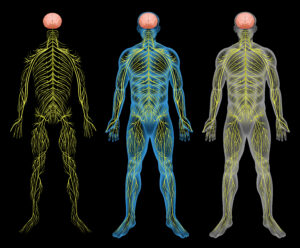If you’ve been prescribed nerve pain medication or are considering it for symptoms like tingling, burning, or shooting discomfort, you’re not alone. Neuropathic pain can be persistent and frustrating, and medication is often the first course of action.
But while nerve pain medication may help reduce symptoms, it’s worth asking: Does it address the root cause of the pain? And are there other safe, supportive ways to enhance your recovery?
What Is Nerve Pain Medication—and What Is It Used For?
Nerve pain medication refers to drugs prescribed to manage pain caused by nerve damage, irritation, or dysfunction. Unlike standard painkillers such as paracetamol or NSAIDs (non-steroidal anti-inflammatory drugs), these medications act directly on the nervous system.

Interestingly, most of these medications were not originally developed for nerve pain. Instead, they belong to other pharmacological classes — such as anticonvulsants or antidepressants — and have been found to influence nerve signal transmission.
Common Nerve Pain Medications in Singapore
| Nerve Pain Medications | Drug Class | Prescribed For | Possible Side Effects |
|---|---|---|---|
| Gabapentin | Anticonvulsant | Diabetic neuropathy, shingles pain | Drowsiness, dizziness, confusion |
| Pregabalin (Lyrica) | Anticonvulsant | Fibromyalgia, generalised nerve pain | Blurred vision, lethargy, weight gain |
| Amitriptyline | Tricyclic antidepressant | Chronic nerve-related pain | Dry mouth, fatigue, constipation |
| Duloxetine (Cymbalta) | SNRI | Diabetic nerve pain, anxiety | Nausea, sleep disturbance, sweating |
| Carbamazepine | Anticonvulsant | Trigeminal neuralgia | Drowsiness, liver enzyme changes |
These medications work by calming overactive nerves or modifying how the brain processes pain signals. However, they do not treat the underlying structural or mechanical cause of nerve irritation, such as spinal misalignment or poor posture.
Important: All medications should be prescribed and reviewed by a medical doctor. The information above is provided for educational purposes only and does not replace professional medical advice.
Common Conditions That May Require Taking Nerve Pain Medication
Nerve pain (also known as neuropathic pain) arises when nerves are damaged or unable to communicate signals correctly. This can result in misfiring signals that the brain interprets as pain, even when no external injury exists.

Here are some conditions where nerve pain medication may be considered as part of a treatment plan:
1. Peripheral Neuropathy
- Often caused by diabetes, infections, or toxins
- Tingling, numbness, or burning in the hands and feet
- Difficulty with balance and fine motor tasks
- Muscle weakness or atrophy in advanced cases
2. Sciatica
- Pain that radiates from the lower back to one or both legs
- Numbness or sharp, shooting discomfort along the sciatic nerve
- Commonly linked to spinal disc issues or postural strain
3. Cervical Radiculopathy
- Compression of nerves in the cervical (neck) spine
- Radiating pain into the arms or hands
- Weak grip strength or reduced range of motion in the neck
4. Dysautonomia
- A condition where the autonomic nervous system is out of balance
- Symptoms may include fatigue, brain fog, irregular heartbeat, digestive issues
- Often overlooked or misunderstood in traditional treatment models
These presentations may share a common factor: a stressed or imbalanced nervous system, which brings us to a deeper understanding of what may be going on beneath the surface.
The Limits of a Nerve Pain Medication-Only Approach
Nerve pain medication can help reduce or manage symptoms, but it’s important to recognise its limitations:
- It doesn’t resolve mechanical or structural

Woman taking nerve medications problems.
If your nerve pain is being caused by spinal misalignment or postural tension, medication will not correct these issues.
- It may only provide short-term relief.Symptoms often return once medication is stopped, particularly if the underlying cause remains unaddressed.
- Potential side effects and adaptation.Some individuals may develop tolerance, dependency, or unwanted side effects with long-term use.
- It can mask important warning signs.By dulling pain signals, medication may reduce your body’s ability to alert you when something is wrong.
This doesn’t mean medication is “bad” — it simply highlights the importance of addressing nerve pain from multiple angles.
Your Nervous System: The Master Communicator
The nervous system controls and coordinates every function in the body — from muscle movement and breathing to digestion and immune responses. It is made up of:
- Central Nervous System (CNS): Brain and spinal cord
- Peripheral Nervous System (PNS): Nerves that extend to limbs, organs, and tissues
When any part of this system is under stress or not functioning optimally, the effects can be far-reaching — even if pain is the only symptom you’re currently noticing.
Autonomic Nervous System: A Delicate Balancing Act
Your autonomic nervous system (ANS) is responsible for automatic functions like heart rate, blood pressure, breathing, and digestion. It has two main branches:
| Branch | Function | Common Effects When Activated |
|---|---|---|
| Sympathetic (“Fight or Flight”) | Prepares body for stress or danger | Increased heart rate, cortisol levels, reduced digestion |
| Parasympathetic (“Rest and Digest”) | Promotes healing and recovery | Slower heart rate, improved digestion, tissue repair |
Many people today live in a near-constant state of sympathetic dominance, driven by work stress, poor sleep, sedentary habits, and digital overstimulation. This chronic stress response can:
- Disrupt nerve function
- Weaken immunity
- Contribute to tension, fatigue, and pain
- Inhibit your body’s natural healing processes
How Chiropractic Care Addresses Nerve Pain
Many types of nerve pain — like sciatica, numbness, tingling, or shooting pain — are often linked to spinal misalignments. That’s because your spine isn’t just a stack of bones; it’s the central highway for your nervous system, housing and protecting the spinal cord and nerve roots that branch out to the rest of your body.
When parts of the spine are misaligned or under stress, it may irritate nearby nerves or place excess pressure on them. This can disrupt the flow of nerve signals, leading to discomfort, pain, or altered sensation.
At Chiropractic Singapore, our role is to:
- Identify areas of misalignment or tension in the spine.
- Use gentle chiropractic adjustments to restore proper alignment and movement.
- Help reduce the mechanical stress on nerves, supporting your body’s natural healing processes.
By improving the structural balance of the spine, chiropractic care can help relieve pressure on affected nerves, making it a supportive approach for individuals experiencing nerve-related pain
How Chiropractic Enhances Nervous System Performance
Chiropractic care does not claim to treat nerve pain conditions directly. Instead, it aims to optimise the spine and nervous system, which may help support overall body function and

improve resilience to stressors.
Our approach is gentle, non-invasive, and tailored to your unique needs. We focus on identifying areas of spinal imbalance or tension that could be affecting the nervous system’s ability to communicate effectively.
Real Benefits Beyond Temporary Relief
Chiropractic care may:
- Reduce mechanical pressure on spinal nerves
- Enhance neurological communication between brain and body
- Improve posture and mobility, which reduces strain
- Encourage balance between the sympathetic and parasympathetic systems
- Support neuroplasticity, the brain’s ability to reorganise and adapt
These outcomes may lead to improved comfort, movement, and quality of life — especially when combined with other healthy lifestyle habits.
What to Expect During a Spinal Check-up at Chiropractic Singapore
Our chiropractors begin with a thorough consultation, which may include:
- Postural and spinal assessment
- Range of motion testing
- Reflex and neurological evaluations
- Advanced scans (e.g., surface electromyography or thermography)
Based on your findings, we develop a personalised care plan that aligns with your goals and health status.
Chiropractic and Nerve Pain Medication: Complementary, Not Competing
| Aspect | Nerve Pain Medication | Chiropractic Care |
|---|---|---|
| Focus | Immediate symptom relief | Long-term functional support |
| Approach | Pharmacological | Neuromuscular and postural |
| Duration | Short- to medium-term use | Progressive care for lasting benefits |
| Risk Profile | Potential side effects (e.g., drowsiness, dependency) | Generally low risk, non-invasive |
| Root Cause? | Manages symptoms | Addresses underlying causes |
Nerve pain medication can play an important role in helping people feel more comfortable—especially in the early stages of pain. It helps to reduce inflammation, numb discomfort, and improve day-to-day function temporarily.
But for those looking to reduce the chances of nerve pain returning, chiropractic care offers something more: a way to support your body’s structure and nervous system function in the long run. By improving alignment, mobility, and nerve flow, chiropractic care helps address the root causes of nerve-related discomfort—rather than simply masking the symptoms.
Chiropractic isn’t here to compete with medication, but to complement it—offering a long-term, proactive approach to healing.
Take the Next Step Towards a More Informed, Holistic Recovery
If you’re currently using nerve pain medication and wondering what else you can do to feel better — without simply masking symptoms — we invite you to consider chiropractic care.
At Chiropractic Singapore, we’re committed to helping you understand your body, support your nervous system, and regain confidence in your health journey.
Book a spinal check-up and take the first step toward clarity, control, and comfort — naturally.









